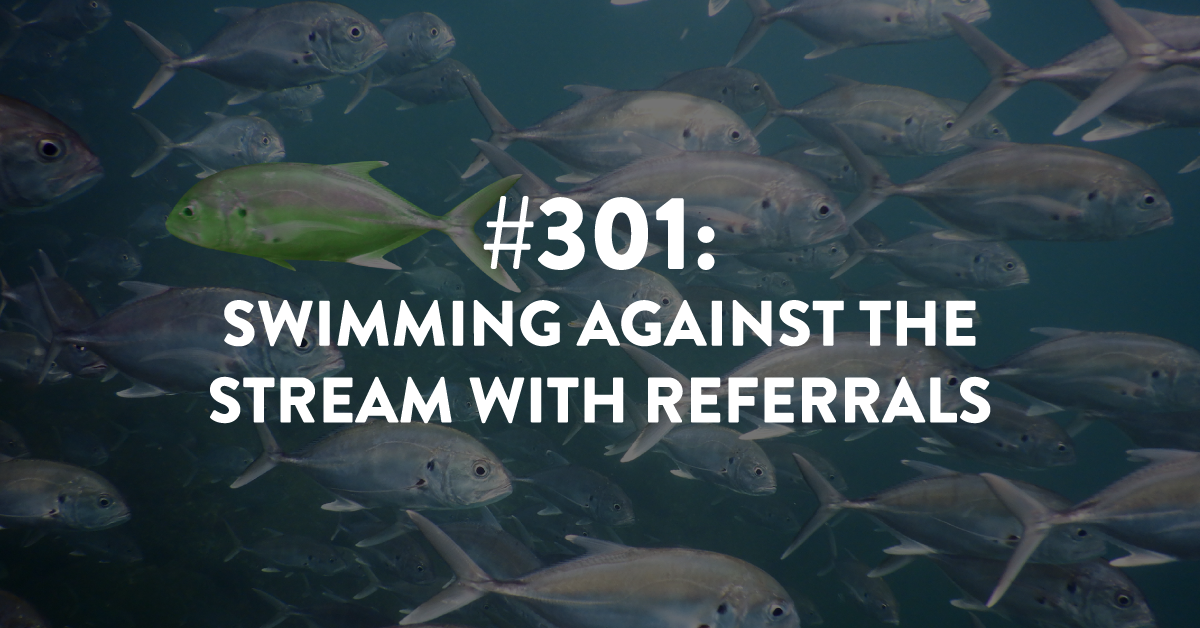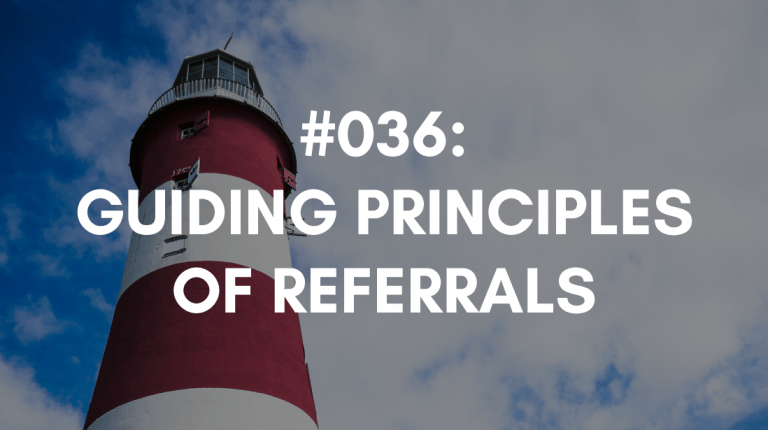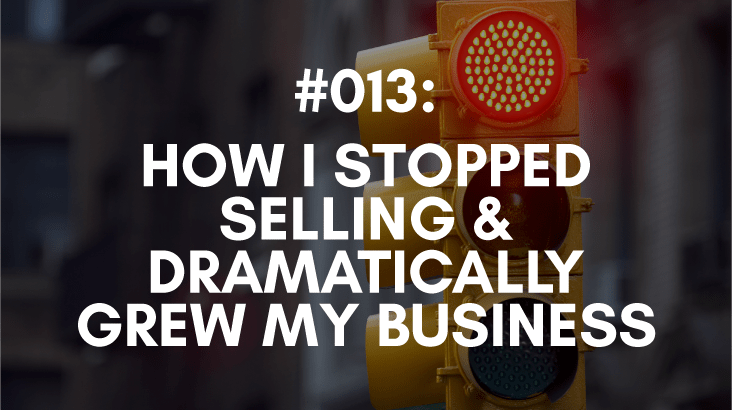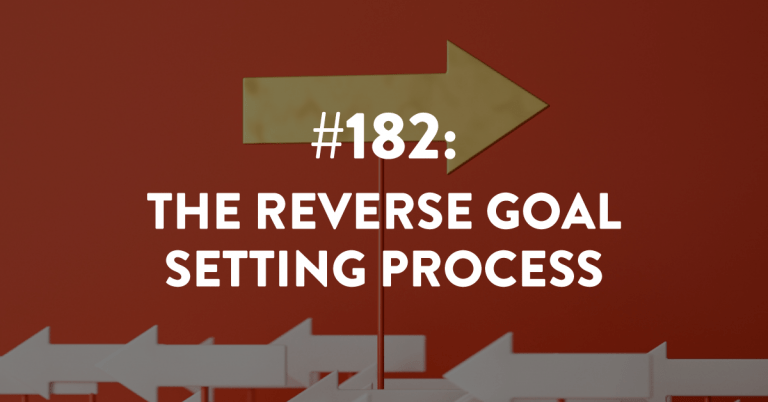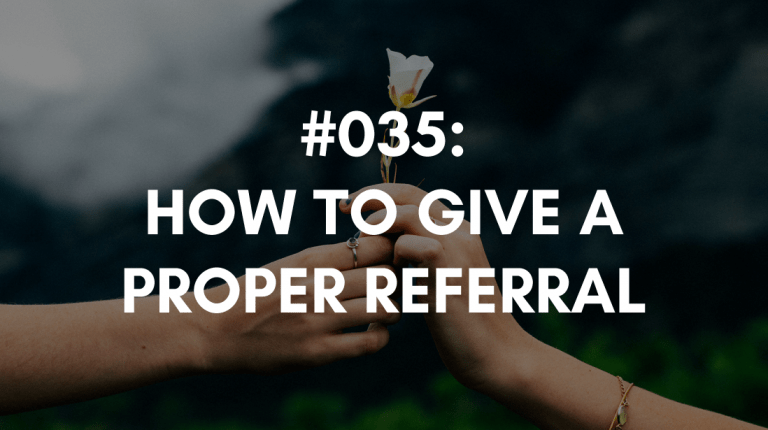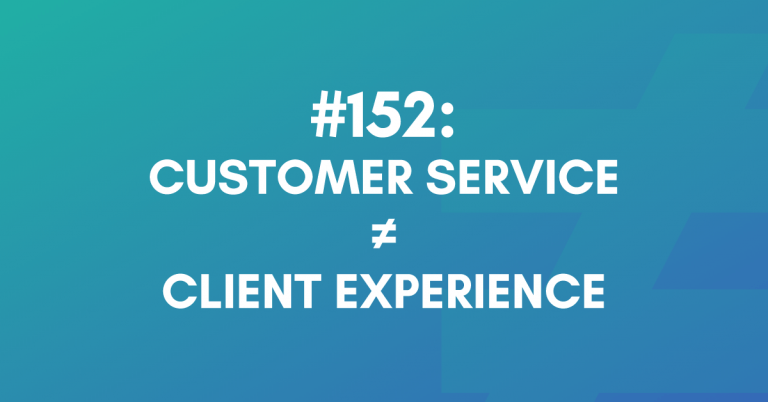Ep #301: Swimming Against the Stream with Referrals
Just because something appears to be true, and everyone goes along with it, doesn’t mean it makes sense.
In this episode, we explore the misconceptions surrounding referrals and how understanding human behavior can revolutionize your referral strategy.
Here are three key takeaways from the episode:
Referrals Aren’t About You: When someone refers a potential client to you, they are primarily focused on helping the person in need, not on you as the solution provider. Understanding this shift in perspective can reshape how you approach referrals.
Make Referrals Their Idea: Referral sources want it to be their idea to refer you. Avoid forcing referrals or constantly reminding them to do so. By creating an environment where they feel empowered to refer you, you increase the likelihood of receiving quality referrals.
Triggering Referrals: People may have great intentions to refer you but can easily forget in the busyness of life. Your trigger to prompt referrals must feel good and be memorable for them to take action. Pay attention to how you approach and engage with potential referral sources.
Remember, building a referable business is all about understanding the psychology behind referrals and creating a positive experience for your referral sources. Let’s take control of our referrals and continue to grow our businesses together!
Links Mentioned During the Episode:
Learn how to work with me inside my Building a Referable Business™ coaching program. Check out the program and then apply to see if you’re a fit.
Want me to build your Referral Strategy for you? Then check out my VIP Referrals In A Day service where I handle the heavy lifting for you. First step is to apply to see if you’re a fit and then we’ll schedule a call. (*A minimum of a 2-person team is required for this Done-For-You service.)
Next Episode:
Next episode is #302, which is another episode created with you and your needs in mind.
Download The Full Episode Transcript
Read the Transcript Below:
Stacey Brown Randall: Just because something appears to be true, and everyone goes along with it, doesn’t mean it makes sense. And it doesn’t make it true.
Hey there, and welcome to episode 301 of the Roadmap to Referrals podcast, a show about helping you build a referable business. I’m your host, Stacey Brown Randall. My journey from a business failure to a successful business now 10 years in, I know generating referrals naturally and consistently has made all the difference. Working with clients around the world, we leverage the science of referrals, protect relationships above all else, and help you build a referable business.
So last year, I was asked to be on a panel discussion. It was a continuing education for attorneys. And so I was asked to be on a panel discussion by a buddy of mine. And he was going to be the moderator, and there was going to be, I think, four of us on the panel. And I was asked to be on the panel to be the person discussing referrals, right, while all the other speakers were discussing other areas of business development.
So the overarching theme or the topic or the title of this panel discussion was business development. And so, of course, my friend did a really good job finding people to talk about like different parts of that and what that looks like when you’re maybe like a smaller firm versus a larger firm and what that can ultimately look like and the overall topic of business development.
But here’s the thing. I may have been there to be the person who was going to talk about referrals and referrals for attorneys in this case, but everyone has opinions when it comes to referrals. Everybody does. Anybody teaching business development or sales today has an opinion on referrals.
Now, in some cases, their opinion is just what worked for them, way back in the day when they used to actually do business development and referrals was a part of it, right? So sometimes it’s just, this is what I’ve done type of opinion or advice.
Other times, sometimes they teach about referrals as a part of one piece of the business development that they teach. And then typically in that case, they’re probably going to be teaching the opposite of what I teach. They’re going to be teaching, asking for referrals.
And so it doesn’t matter that I was the person there on that panel to talk about referrals. When the questions about referrals came up, everybody on the panel had opinions, and had advice, and had strategies, and tactics, and things that they wanted to add to the conversation.
Because let’s face it, referrals are awesome. And everybody wants to talk about them. And everybody knows that referrals will get your attention. A day does not go by where I don’t see an email come across my inbox or a social media post somehow land in my thread, right, land in my feed, that’s gonna talk about this how to get referrals or how great we did getting these referrals or look at this case study of referrals or here’s what you gotta do to get referrals.
And a lot of times people use referrals, and I’ve talked about this before on the podcast, a lot of times people use the word referrals and they use that definition, that word, very loosely. And they apply a bunch of things as to what could ultimately be a referral.
And so I will see things that come across where people will be like, content marketing for referrals. Or it’ll be appointment setting for referrals. Or it’s just the typical advice regarding, you know, send out your newsletter and you’ll get referrals. Do social media, you’ll get referrals. Or ask for those referrals, pay for those referrals, right?
So it’s kind of this blend and this mix of how people use what they teach and then they talk about it from the referral perspective. And I remember, I have a friend who many, many years ago, she said to me, that must be exhausting for you to read this stuff and realize that people are using the word referrals because it’ll get people’s attention.
But ultimately what they’re probably teaching them has nothing to do with referrals, but they use it in the context of the title or the headline or within the first paragraph of the article or whatever it is, because they know it’s going to get people to open up emails and to pay attention.
And then it just completely, as I told her, yes, that is exhausting. And then it just completely dilutes what it actually means to have a strategy in place inside your business where you’re going to ultimately generate referrals.
Because if you’re using, hey, we do SEO, and we do email marketing, and we do a newsletter, and we do social media, and all those mechanisms are delivering us referrals, well, that’s not true.
They’re delivering you leads. You can only have a referral delivered to you if it comes from another person.
And so it just gets watered down, and it just gets confusing. And so people are like, oh, look at this. They can use this, fill in the blank, to generate referrals. When if it’s not actually generating referrals from another human, right? And that’s why I just think digging into the data, it’s so very important.
So when my clients come into work with me, and they’re telling me, hey, I get 50 referrals a year. I get 100 referrals a year on average. I’m like, great. Now I want to know exactly who are the humans by name, and by type, that are giving you those 50 referrals on average in a year, or those 100 referrals on average in a year, whatever it is. Maybe it’s 12 referrals on average in a year, like great, now who are the humans that delivered those 12 or gave you those 12 referrals? Like there’s always a name attached to the referrals.
And so I say all this because I want to put in context what I want to talk about today for this episode. And to my friend’s point, yes, it is exhausting to see people out there using referrals, quite frankly, as a bait and switch as to ultimately how they’re bringing in business.
And here’s the thing. I do an email newsletter. I think you should have one. I don’t think there’s anything wrong with that. I do social media. I think you should do content marketing. There’s a lot of things that I do in my business that I think that for a well-rounded business, you should probably be doing.
But I get really just annoyed, quite frankly when I see things where people are like, oh, look at all these referrals that we got for our client, or oh, look at all these referrals that I helped bring into my company. And you’re using referral so loosely.
It’s not actually defined as a human referred to another human. But you’re using referral as like, well, this lead source just referred me this lead. No, actually, they didn’t refer you anything. That’s a lead source that produced a lead. And the language here matters. The nuances here matters.
And I know people get all caught up in it. And they’re like, it’s not that big of a deal. It really is if you’re thinking about strategies, and you’re thinking about what a referral is, and why you want them, and how and why they are so ultimately amazing. So yes, it can be exhausting.
And I find myself in positions where I am the contrarian, just as I was on that panel discussion. I was the contrarian. I was the person who was there to talk about referrals, and everybody else on that panel had an opinion on referrals, which is fine. I have opinions on other things. I’m not saying having opinions on the topic that I was there to talk about is the issue.
But here’s the thing. Their opinions contradicted mine. And so it was just another reminder to me that I am constantly swimming against the stream. I am constantly swimming against, I’m swimming upstream, I’m swimming against the current, and I am pushing in one direction while everyone else is just going on the other direction with the current of what is known, because it’s just been around for so long.
So that, what I call awful advice, right? Other people would say, it must be true because it’s been around forever.
I read something recently that Mike Michalowicz, who is the author of a number of books, my favorite, of course, is Profit First. It’s something that I institute in my own business. So Mike Michalowicz is the author of Profit First. And I read something that he wrote recently.
And he said this, and I was like, I need to like, you’re going to probably see this quote come out on social media at some point in the future as well, because I was like, thank you, Mike. I’m talking about it like we’re on a first name basis.
I mean, I have been on his podcast before to talk about referrals without asking. He loved it. He was like, this is a great topic. This is what people need to hear, which was great. But I don’t know the man. But I’m talking about him like I know him.
But this quote that Mike gave, I was like, YES, and this is what I want you to hear. So here’s what Mike said. Now, he was talking about this from a Profit First perspective, but it fits. And we’re gonna take what he said and we’re gonna put it into practice from a referral perspective.
So Mike’s quote was this, “Just because something appears to be true and everyone, air quotes, goes along with it, doesn’t mean it makes sense and it doesn’t make it true.” Let me just read that again. Just because something appears to be true and everyone goes along with it doesn’t mean it makes sense and doesn’t make it true.
Let’s put this in the context of referrals. As some would tell you, I think they’re wrong, but as some would tell you, asking for referrals is simple, logical, and clear. But, and this is a huge but, it doesn’t account for human behavior.
When I was reading what Mike wrote, and he was talking about it from a Profit-First perspective versus how traditionally, I guess, generally accepted accounting principles kind of like go, his Profit First kind of goes against the GAAP formula, which is generally accepted, GAAP stands for Generally Accepted Accounting Principles.
He was talking about how his profit-first goes against GAAP. And that’s when he made that comment. Like, just because something appears to be true, and everyone goes along with it doesn’t mean it makes sense and doesn’t make it true.
It’s the same thing with referrals. We can apply this exact same concept to referrals as well. Asking for referrals, right, it seems very simple. Just ask for them. Say, hey, do you have a referral for me? It seems very logical, and it sounds clear.
But, but, but, but, but, but, it doesn’t account for human behavior. And when you don’t account for human behavior, that’s when you get things that don’t work, and that people avoid. And let’s be honest, you’re probably here listening to this podcast, whether it’s your first episode or you’ve been here for five years with me listening to every episode every Tuesday, you’re here because you don’t want to ask.
It may seem simple, it may seem clear, and it may be logical. But when you take into account how it makes you feel, you can’t run away fast enough in the opposite direction, because that is not what you want to do. That is not behavior. That asking behavior is not what you want to do. It’s not how you want to show up. It’s not how you want to be seen. And this is really important that we pay attention to it.
So this got me thinking about human behavior. We know that human behavior factors into everything we will or will not do. Right? Whether that’s our habits or our limiting beliefs or our, you know, I guess whatever the opposite of limiting beliefs, like non-limiting beliefs, the things we believe in ourselves, right?
Human behavior is like a huge facet of like why we do the things we do. Right? Why we do the things we do and how they show up in our behavior. And so I wanted to dig in with three points when it comes to human behavior with referrals.
So let’s talk about this first one. And again, this is all based on the human behavior because human behavior is actually what we’ll ultimately end up doing. No matter how the bad advice is symbological and clear, our human behavior, if it’s not taken into account, we are having nothing to do with it.
So here’s point number one. Referrals aren’t about you. Now, I talk about this a lot. And we will have a series coming up on the podcast where we’re going to dive in deeper into the science behind referrals and do that over a number of episodes.
And so I will be going into this point more in depth, because it’s the first point that I make when I talk about the science behind referrals. But instead of going into the science of the referral piece here, this is what I want you to understand, is that referrals aren’t about you.
And I know for some that’s really hard to hear, but you need to hear this. At the moment someone is referring a potential new client to you, they aren’t thinking about you, at least not first. Who they are thinking about first is the person they’re talking to who has a problem. And yes, that person has a problem you can solve, but that’s not what they’re focused on.
And the moment they’re having a conversation with a colleague, a friend, a business buddy, someone in a networking group, somebody who lives down the street, someone they went to college with, whatever it is, at the moment they’re having a conversation, and a problem bubbles up and the referral source is talking to their friend or colleague who has this problem, the first thing they are thinking about is, I wanna help them. And then they think, how can I help them?
It’s like a split second. Oh my gosh, we gotta get you some help. Oh my gosh, I know exactly how to help you. Then they think about you as a solution provider, but you aren’t first. So referrals aren’t about you. And you have to understand this piece.
This is why when people are like, they tell me that I have to ask for referrals, I’m like, how’s that feel? And they’re like, terrible. I’m like, yeah, because asking for a referral makes it about you. But a referral’s not about you. That’s not what’s going on in the brain of that referral source when they’re ultimately coming across an opportunity to refer to you.
They’re not thinking about you. They’re thinking about their friend who has a problem, and they’re going to help them solve it. How they’re going to help them solve it is by then referring them to you. You’re just the solution provider.
And yes, I know, you get a new client, and it feels amazing. It is amazing. It is awesome. But you’re not the primary point of thought when a referral is being given. It just so happens that person has a problem that bubbled up that you are able to solve.
And you have to be willing to switch your thinking on this. Because once you switch your thinking on this from that science perspective, the human behavior piece falls into place. Of course, asking someone to refer you feels awful. Because you’re asking for someone to think of you first.
But when a true referral, a real referral is actually happening, you’re not the first thing that’s being thought about. It’s the person they’re trying to help. And so asking contradicts, right? Asking that person to think about referring you or to refer you, contradicts the science. And it’s starting to manufacture or artificially create, which cannot be artificially created. And that’s why I feel so terrible.
So when you hear things about how you’re supposed to go about generating referrals, and in your mind you’re thinking, yeah, well, I mean, that sounds logical and simple and clear, but does it take into account human behavior and will I actually do it?
Which is why most people are like, ugh, no thank you on the asking piece. I think it’s great that it worked for those handful of unicorns out there in the world, but for me and the majority of folks, that’s not going to ultimately work for me. So that’s the first point I wanted to make about human behavior when it comes to referrals.
Hey there, pardon the interruption. It’s crazy to think that you could be just 90 days away from doubling, tripling, or quadrupling your referrals. The roadmap and the support plus accountability that you need is just waiting on you. It’s all inside my coaching program, Building a Referrable Business, or BRB for short. Go to StaceyBrownRandall.com/referable to learn more about the program and click on the link to submit your application. That’s your first step. Now, back to the episode.
Okay, let’s dive in and talk about point number two of human behavior when it comes to referrals. Here’s the thing that I think people don’t think about when they think about a referral happening. Your referral source, even though they’ll probably never be able to articulate this to you or verbalize this to you, your referral source, they really actually want it to be their idea to give you a referral.
When I’m referring to you, I want it to be my idea to give you a referral. I don’t want you to tell me to do it, or ask me repeatedly to do it, or to make me feel uncomfortable in telling me that I need to do it, or that I should do it, or will I do it.
When somebody gives a referral, and you know what I’m talking about, it’s that potential client that shows up, and they’re like, I’ve heard amazing things about you. They were referred to you by someone else. I trust this person. They said you’re the right person. I understand how you work with clients. Let’s talk about what it looks like to work together. Here, take my money.
You know when you have one of those referrals. It’s because everything that needs to be true is true. They’re talking to somebody that they respect and that they trust. They identify a problem that that prospect has. The prospect is talking to someone that they trust, that is being your referral source. And then the solution was provided. And the solution that was provided is that, hey, I got to connect you with fill in the blank of your name.
In that moment for your referral source, yes, they are helping you grow your company. And that’s amazing. And you’re getting a new client. And that deserves props. But really, when they’re referring that person to you, that’s not about you, right? As we just talked about, behavior point number one. And behavior point number two is, is they really want it to actually be their idea to give you a referral.
Which is why the asking advice, or even the incentivizing, constantly incentivizing, or trying to be overly promotional and gimmicky, doesn’t ultimately work long term. I would also argue it doesn’t work in the short term either. Because if your referral source wants it to be their idea to give you a referral, well, then that clearly should tell you, you need to be showing up differently to your referral sources so that it can be their idea to give you referrals.
And yes, that does mean there are some things that you can do, that you can control in that process, to actually make those referrals ultimately happen. So remember that when you’re receiving a referral, it was actually, hopefully done correctly, right?
In terms of the referral source, it was their idea. And that actually makes the referral feel that much better to then give that referral to you because it was their idea. It wasn’t you telling them they should be doing it, okay? That’s behavior point number two.
So let’s look at human behavior point number three when it comes to referrals. And it’s this. I may have great intentions, but easily forget to refer you. So your trigger to get me to refer you better feel good when I receive it so I notice it. Let that sink in for just a minute.
I may have great intentions, but will easily forget to refer you, you know, because I’m busy and I’m running a business and a family. So your trigger that you’re gonna do to me to get me to refer to you, it better feel good when I receive it, because that’s the only way I’m gonna notice it and remember it.
If you want the intended outcome of someone actually referring to you, you will need to trigger referrals happening. But how you trigger those referrals happening, like the what you do with your trigger, it matters. Because you do it wrong or incorrectly and you’re going to turn off that referral source or that potential referral source.
You do it right, you do it correctly, then I’m going to notice it and it’s going to sit in my subconscious about how I feel about you when an opportunity comes along to ultimately be able to refer you.
Most of what I teach When it comes to the different strategies that my clients are going to deploy to be able to generate referrals, the first place I always pay attention to is how is the receiver going to feel when this lands on them? You should probably ask yourself the same thing.
This isn’t about what you’re comfortable doing, right? But you should actually be comfortable doing it because then you’re more willing to do it. And if you’re comfortable doing it, it’s probably kind, probably is polite, probably is good, unless you’re dead inside. And then I don’t really know how you operate or live your life because I don’t know what that’s like.
But I always pay attention to, like, well, like, when someone comes to me in my coaching program or my VIP level, and they’re like, hey, can you help me with this language? And I always ask them specific questions. Now, most of them know to anticipate the questions, so they answer those before I can ask them.
And I always ask specific questions as I’m helping them craft the right referral seed language, which is the big triggering point for us and what we’re doing with referrals and what I teach my clients, the strategies and tactics that I teach my clients.
And so when we are looking at this from this perspective of what this ultimately will look like, right? I’m always thinking about when this lands on the receiver, when they, I mean, when this lands on the referral source as the receiver of this messaging and this, whatever this is and whatever we’re saying, how is it gonna feel?
Because if they feel bad receiving it, they’re gonna shut down and ignore and move on and very quickly forget and be like, don’t wanna really relive that. But if it feels good when they’re receiving it, they’re going to be open to it, which means whatever language we’re using, whatever we’re doing, it has a chance to actually start occupying space in their mind.
So people probably do want to refer you. I actually believe that people are out there, and they’re not intentionally being like, oh, I have a referral to send you, but ha, ha, ha, I’m not going to do it. I don’t think anyone walks around and thinks like that. I mean, I guess some people do. I don’t know those people. At least I try not to know those people.
But most people, I think, want to refer when the opportunity presents itself. But remembering to refer to you, or remembering to recognize this is an opportunity to refer to you, usually passes people by in the busyness of life and the fast-paced world that we live in and the 24-7 nature that we are in.
And in those conversation points, they may have the best of intentions in that moment to refer you. But then they forget, and it’s not because they don’t care. It’s because they’re busy. Like, look at your to-do list, and imagine everybody else out there that you want to refer to has the exact same long to-do list that you have.
Like, put yourself in their shoes. Put yourself in the receiver’s shoes. Put yourself in your referral source’s shoes. This isn’t that they don’t want to refer you. It’s that they’re probably going to forget. So your job to trigger those referrals to happen, it better feel good for them, because it’s the only way it’s going to get their attention. And you’ve got to do this right.
Which means how often you do it matters. Some people are like, I’m going to take people to coffee every single month. And I was like, well, by the second month, I’m not responding to you. Because I don’t have time to go to coffee with somebody every single month, no matter how much I love you. Unless maybe I’m married to you.
So the reality of that is, the what you do, the how often you do it, the cadence behind doing it, the what you say, all that stuff matters. And that matters because we’re paying attention to the human behavior behind what’s making referrals happen. And that’s just what I want you to focus on.
So these three points that we talked about on the human behavior when it comes to referrals, these three points are, number one, referrals aren’t about you. Number two, I really want it to be my idea to give you a referral, not have it forced upon me. And number three, I may have great intentions, but easily will forget to refer you because I’m busy.
So your trigger to get me to refer you, it better feel good when I receive it so that I actually notice it. And then, of course, take action upon it. Food for thought. Think about that. Let me know if you have any questions.
The resources mentioned in this episode can be found on the show notes page at StaceyBrownRandall.com/301, for three hundred and one. We are back next week with another great episode created with you and your needs in mind. Until then, you know what to do my friend. Take control of your referrals and build a referable business. Bye for now.

